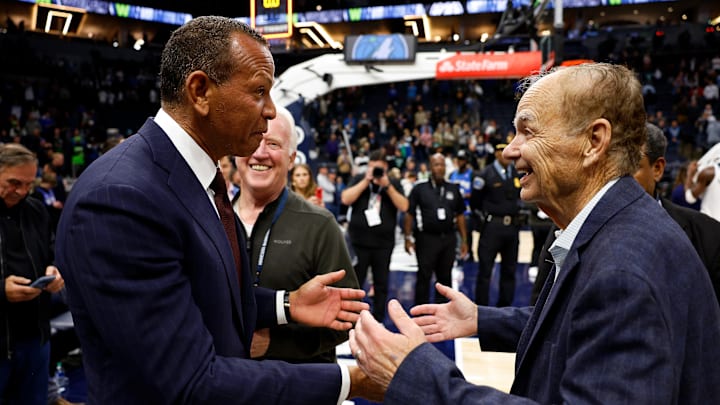After a solid team win against the Detroit Pistons the night before, Timberwolves fans woke up to shocking news the following morning. Glen Taylor issued a statement explaining his intention to remain the majority owner of Minnesota's two basketball franchises: "The Timberwolves and Lynx are no longer for sale," said Taylor.
In 2021, Glen Taylor wasn't ready to give up the team entirely. He kept majority ownership while bringing in successful business entrepreneur Marc Lore and former MLB star Alex Rodriguez, who agreed to pay Taylor $1.5 billion in installments to eventually take over ownership of the team. Both ownership groups have worked together to help the team succeed while preparing a smooth transition for when Taylor is ready to sell.
After Lore and Rodriguez put the closing deal in motion in December, the purchase agreement terms were not met within the 90-day time frame that the contract detailed. But just last week, Rodriguez and Lore submitted financial documentation to the NBA to validate their intention to take over ownership.
While Taylor easily could have granted some leniency in allowing an extension for purchase, which expired on Wednesday, March 27, he did not, leading to the majority owner ending the deal altogether. This ends a three-year process with Lore and Rodriguez making many wonder what went wrong between the two ownership groups.
A spokesman for Marc Lore and Alex Rodriguez says Taylor is having “an unfortunate case of seller’s remorse.” pic.twitter.com/dvfJaYDKm9
— Jon Krawczynski (@JonKrawczynski) March 28, 2024
Spokespeople from Marc Lore and Alex Rodriguez's team issued a statement addressing upholding their end of the bargain and Glen Taylor's "unfortunate case of seller's remorse." After so many underwhelming seasons, it's hard to blame Taylor for wanting to be a part of the team's current success. However, that was different from the deal Lore and Rodriguez agreed to, especially after much of their decision-making has attributed to the team's recent success.
Since joining the team, Lore and Rodriguez have been actively involved, regularly sitting courtside at home and away games. Their prior business ventures helped them bring high-level business executives to help guide the organization. And both played a crucial role in bringing in Tim Connelly from Denver, who has constructed this 50-win Wolves roster as the new President of Basketball Operations.
The Timberwolves have improved vastly these last three seasons, making the playoffs each year since Mark Lore and Alex Rodriguez became involved in ownership. After the best regular season in franchise history, this year's playoff run holds high expectations, as many believe Taylor wants to be credited for owning and controlling the team during their most historic season. Others think he wants to resell the team at a higher value after the newfound success that he's really had no share in.
Rumored reports say that Glen Taylor felt several essential steps in the agreement process had yet to be met and didn't feel Lore and Rodriguez deserved an extension. After failed negotiations with a private equity firm, an investment deal fell through, leaving Lore and Rodriguez searching for a backup plan, and Taylor filled with doubt as the 90-day window closed in.
The relationship between Taylor and his successors – Lore and Rodriguez – disintegrated over the past two-plus years, sources tell ESPN. Lore/Rodriguez did raise money necessary to purchase controlling interest, but Taylor contends that they didn’t meet contractual deadlines…
— Adrian Wojnarowski (@wojespn) March 28, 2024
Trust between both ownership groups has been on the decline. While Taylor said he intends to continue working with Lore and Rodriguez, the business partners have reassured their commitment to completing the deal to purchase the team. During the last and most crucial stretch of the regular season, neither group wants to create a distraction to disrupt the teams' on-court success. But now, both sides have publicly stated their intentions to take over the team, which is already a distraction.
Lore and Rodriguez will still retain 40% of the team's ownership which they have already bought. However, with many contract extensions going into effect at the start of next year, the front office will have to make many tough decisions about spending money to build for the future, which will be even more difficult with feuding owners. After three years of hard-earned growth, it would be a shame to see the Timberwolves fall apart over selfish ownership. With no short-term solution near, a long-term lawsuit could be brewing in Minnesota.
